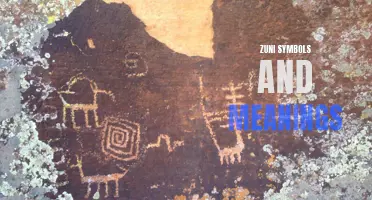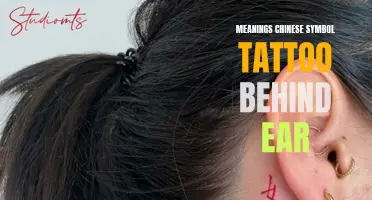
Feathers have long been recognized as powerful symbols across different cultures and civilizations. From ancient Egypt to Native American tribes, feathers hold a deep significance and are often associated with spiritual connections, freedom, and enlightenment. In various mythologies and folklore, feathers are seen as a communication tool between the earthly realm and the divine. Beyond their physical form, feathers represent a higher message, carrying both cultural and personal meanings that can resonate with individuals in profound ways. Let's explore the intriguing symbolism behind feathers and unravel the secrets they hold.
What You'll Learn
- What is the meaning of the feather symbol in different cultures and religions?
- How has the symbolism of feathers evolved over time?
- What does the feather symbolize in Native American culture?
- Are there different meanings associated with different types of feathers?
- How is the feather symbol interpreted in modern society?

What is the meaning of the feather symbol in different cultures and religions?
Feathers have been used as symbols in different cultures and religions for thousands of years. They hold significant meaning and are often associated with spiritual beliefs and customs. The feather symbol can represent various concepts and ideas depending on the culture or religion. Here, we will explore the meaning of the feather symbol in different cultures and religions.
Native American Culture:
Feathers hold great importance in Native American culture. They are seen as gifts from the birds, connecting humans to the spiritual realm. Feathers are often used in ceremonial rituals and are believed to possess qualities such as wisdom, strength, and freedom. Different feathers hold different meanings. For instance, the eagle feather is considered sacred and is used in rituals to communicate with the Great Spirit.
Egyptian Culture:
In ancient Egypt, feathers were associated with Ma'at, the goddess of truth, justice, and harmony. Ma'at was often depicted with a feather in her hair or on her scales, symbolizing the balance of the universe. Feathers were also used in elaborate headdresses worn by pharaohs, representing their divine status and connection to the gods.
Christianity:
In Christianity, feathers are often associated with angels. They are seen as a symbol of protection and divine intervention. Feathers are believed to be signs of God's presence and love. They can also represent the ascension of the soul or the ability to rise above earthly desires and reach spiritual heights.
Celtic Culture:
In Celtic culture, feathers are associated with the Celtic deity Morrigan, who is often depicted with a cloak of black feathers. The feathers symbolize her ability to shape-shift and fly between the realms of life and death. Feathers are also seen as a symbol of communication with spirits and the ability to receive divine messages.
Chinese Culture:
In Chinese culture, feathers are often associated with the Phoenix, a mythical bird representing immortality and rebirth. The Phoenix is believed to have feathers of five different colors, each representing a specific virtue, including benevolence, righteousness, propriety, wisdom, and sincerity. Feathers also symbolize good luck and are used in various traditional ceremonies and rituals.
Hinduism:
In Hinduism, the feather symbolizes the connection between the physical and spiritual realms. It represents the ability to transcend earthly limitations and reach higher states of consciousness. Feathers are often associated with Hindu deities, such as Lord Vishnu, who is sometimes depicted holding a feather as a symbol of his divine power and protection.
Overall, feathers hold significant meaning in various cultures and religions. They symbolize qualities such as wisdom, freedom, protection, and spiritual connection. Whether used in rituals, as decorations, or as representations of divine beings, feathers continue to inspire awe and reverence across different cultures and belief systems.
Unlocking the Mysteries of the Inguz Symbol: The Meaning and Significance
You may want to see also

How has the symbolism of feathers evolved over time?
Feathers have held symbolic significance for various cultures and societies throughout history. These delicate and intricate structures have been associated with diverse meanings and beliefs. Over time, the symbolism of feathers has evolved, reflecting changes in cultural values, religious beliefs, and social contexts.
In ancient civilizations such as Egypt and Mesopotamia, feathers were seen as a representation of power, divine authority, and spiritual connections. Kings and pharaohs adorned themselves with elaborate feathered headdresses as a sign of their sovereignty. Feathers were also believed to be symbols of communication between humans and the gods, often used by priests during rituals and ceremonies.
In Native American cultures, feathers were considered sacred and were used in religious rituals, tribal ceremonies, and adornments. Each feather had a specific meaning and significance, often associated with specific birds. For example, the eagle feather symbolized courage and wisdom, while the owl feather represented intuition and magic. Feathers were often used in headdresses, clothing, and accessories to convey status, identity, and spirituality.
During the medieval period in Europe, feathers became a symbol of nobility and chivalry. Knights would wear plumes in their helmets as a sign of their rank, bravery, and honor. Feathers also became fashionable accessories for the elite, adorning hats, fans, and clothing.
In more recent history, feathers have been associated with freedom, lightness, and spirituality. The image of a feather floating in the wind has come to represent the ephemeral and transient nature of life. Feathers have also been used as symbols of hope, guidance, and protection. Many religious and spiritual traditions use feathers as tools for healing, cleansing, and energy work.
In contemporary society, feathers have become popular design elements in fashion and interior design. Feathers are often used in accessories such as jewelry, hair ornaments, and clothing to add a touch of elegance, sophistication, and whimsy. Feathers are also commonly used in home decor, such as in dream catchers, wall hangings, and decorative pillows, to create a sense of ethereal beauty and tranquility.
Overall, the symbolism of feathers has evolved over time, reflecting the changing beliefs, values, and contexts of different cultures and societies. From representing power and divinity in ancient civilizations to symbolizing freedom and spirituality in modern times, feathers continue to captivate us with their beauty and carry profound meanings.

What does the feather symbolize in Native American culture?
Feathers hold great significance in Native American culture and are considered sacred objects. They are often used in various ceremonial and spiritual practices, as well as for personal adornment. In Native American mythology and beliefs, feathers symbolize several important qualities and hold spiritual and cultural significance.
One of the significant meanings behind feathers is their association with birds, which are considered messengers from the spirit world. Native Americans believe that birds carry prayers to the heavens and that their feathers are gifts from the sky. Therefore, feathers are revered as spiritual tools and are used to connect with the spiritual realm during ceremonies and rituals.
Feathers also symbolize power and strength. They are believed to possess the power of the bird they came from, representing their characteristics such as courage, agility, and speed. Warriors would wear feathers to honor their acts of bravery and to invoke the spirit of the bird, hoping to gain its strength and protection in battle.
Furthermore, feathers are seen as symbols of truth and wisdom. In Native American culture, elders are highly respected for their wisdom and experience. They are often adorned with feathers to reflect their role as spiritual leaders and knowledge keepers.
Feathers are also used to express gratitude and to show appreciation for nature and the natural world. Native Americans believe in the interconnectedness of all living beings and view feathers as gifts from the animals and birds that share the earth with them. By wearing or using feathers in ceremonies, they acknowledge and honor the bond between humans and nature.
Moreover, feathers hold distinct meanings depending on their color and type. For example, the eagle feather is considered the most sacred and is often used in important ceremonies. It symbolizes strength, courage, and freedom. Conversely, owl feathers are associated with wisdom and intuition, while hawk feathers are believed to bring vision and clarity.
In conclusion, feathers play a significant role in Native American culture. They hold multiple symbolic meanings, representing messages from the spiritual realm, power, strength, wisdom, and gratitude. Feathers are cherished and used in ceremonies, rituals, and personal adornment to honor and connect with the natural and spiritual world. Their beauty and spiritual significance continue to be cherished and respected by Native American communities today.
The Deep and Powerful Meaning Behind the Hei Matau Symbol
You may want to see also

Are there different meanings associated with different types of feathers?
Feathers are fascinating and intricate structures that have many symbolic meanings in different cultures and contexts. In various traditions, feathers hold deep spiritual significance and are often associated with different types of messages and qualities. Each type of feather is believed to carry its own unique symbolism and represents different aspects of life. Let's explore some of the different meanings associated with various feathers.
- Eagle Feathers: In Native American culture, eagle feathers are considered sacred and are used in religious ceremonies. They symbolize strength, wisdom, and honor. They are also seen as a sign of connection to the spiritual realm and are often worn as a mark of achievement and bravery.
- Owl Feathers: Owls are associated with wisdom and intuition due to their ability to see in the dark and navigate through the unseen. Owl feathers are believed to bring clarity, insight, and the ability to see things beyond the ordinary. They are often used in rituals and ceremonies related to divination and spiritual guidance.
- Peacock Feathers: Known for their vibrant colors and striking patterns, peacock feathers represent beauty, grace, and prosperity. They are believed to bring good luck and are often used in home decor or as accessories to enhance one's sense of style and self-expression.
- Hawk Feathers: Hawks are known for their keen eyesight and their ability to soar high above the ground. Hawk feathers symbolize vision, focus, and heightened awareness. They are believed to bring clarity and perspective, helping individuals see things from a higher vantage point and make informed decisions.
- Raven Feathers: Ravens have long been associated with magic, mystery, and transformation. Raven feathers symbolize the power of illusion and the ability to navigate through darkness. They are believed to bring transformation, change, and a deeper understanding of the hidden aspects of life.
- Goose Feathers: Geese are known for their strong sense of community and teamwork. Goose feathers symbolize loyalty, cooperation, and the importance of working together for a common goal. They are often associated with family and relationships, representing unity and support.
- Swan Feathers: Swans are graceful creatures that symbolize love, beauty, and purity. Swan feathers are believed to bring inner peace, emotional healing, and a sense of balance. They represent the power of love and the ability to navigate through life's challenges with grace and elegance.
It's important to note that these meanings may vary across different cultures and belief systems. Additionally, personal interpretations of feather symbolism can differ from one individual to another. Ultimately, the meaning of a feather is subjective and can be influenced by personal experiences and perspectives.
In conclusion, feathers carry various symbolic meanings across cultures and belief systems. From the strength and wisdom of the eagle to the transformation and mystery of the raven, each type of feather represents different aspects of life and carries its own unique energy. Whether used in rituals, ceremonies, or as decorative items, feathers continue to fascinate and inspire us with their beauty and symbolism.
The Deep Significance of Omega Symbol Tattoos Unveiled
You may want to see also

How is the feather symbol interpreted in modern society?
The feather has long been a symbol with deep meaning in various cultures and societies. In modern society, the interpretation of the feather symbol has evolved to reflect the values and beliefs of contemporary times. Today, the feather is often seen as a symbol of freedom, spirituality, and connection to nature.
One of the main interpretations of the feather symbol in modern society is freedom. Feathers are associated with birds, which are known for their ability to fly and roam freely in the sky. In this context, the feather represents the desire for freedom, both in a literal sense and in a metaphorical sense. It symbolizes the longing to break free from societal constraints, to soar above limitations, and to embrace a life filled with independence and self-expression.
Spirituality is another important aspect of the feather symbol in modern society. Feathers have been used in various spiritual rituals and practices throughout history. In many indigenous cultures, feathers are believed to hold spiritual energy and are seen as a connection to the divine. In this context, the feather represents a bridge between the physical and spiritual realms, serving as a reminder of the interconnectedness of all things. It is often seen as a symbol of guidance and protection from higher powers and is used in meditation and spiritual ceremonies.
The feather symbol is also often associated with nature and its inherent beauty. Feathers are marvels of nature, intricate and delicate yet resilient. They symbolize the harmony and balance found in the natural world and act as a reminder to cherish and protect the environment. The feather symbolizes the interconnectedness between humans and nature, reminding us of the importance of preserving and respecting the earth and all its creatures.
In addition to these interpretations, the feather symbol has also taken on personal meanings for individuals in modern society. Many people choose to incorporate feather motifs into their clothing, jewelry, and tattoos as symbols of their own personal journeys, experiences, and beliefs. Each feather can hold a unique meaning to the individual, representing qualities such as courage, resilience, or a connection to a specific loved one or memory.
Overall, the feather symbol has evolved in modern society to represent freedom, spirituality, and connection to nature. Whether used in a personal context or on a broader scale, the feather continues to hold deep meaning and resonance for many individuals. It serves as a powerful reminder of the values and beliefs that are cherished in today's world.
Exploring the Mystical Symbols and Hidden Meanings behind Grateful Dead's Iconic Imagery
You may want to see also
Frequently asked questions
What does a feather symbolize?
Feathers are often seen as a symbol of freedom, transcendence, and communication with the divine. Many cultures and religions associate feathers with spiritual beings, such as angels or spirit guides. They can also represent a connection to nature, the ability to rise above challenges, and a reminder to trust in one's own intuition.
Finding a feather is often seen as a sign or message from the spiritual realm. It can be interpreted as a sign of guidance, protection, or acknowledgement from a higher power. Many believe that when a feather crosses your path, it's a reminder to pay attention to the signs around you and to trust your intuition. Some people also see finding a feather as a symbol of love and support from loved ones who have passed away.
Different colored feathers can carry different symbolic meanings. White feathers are often associated with purity, innocence, and spiritual connection. Black feathers are believed to represent protection, mystery, and healing. Brown feathers symbolize stability, grounding, and a connection to the earth. Other colors, such as blue, green, or purple, can carry their own unique symbolism depending on personal beliefs and cultural interpretations.
It's important to note that the specific meanings associated with feathers can vary across different cultures, spiritual practices, and personal beliefs. Ultimately, the interpretation of feather symbols is a deeply personal and subjective matter.



















